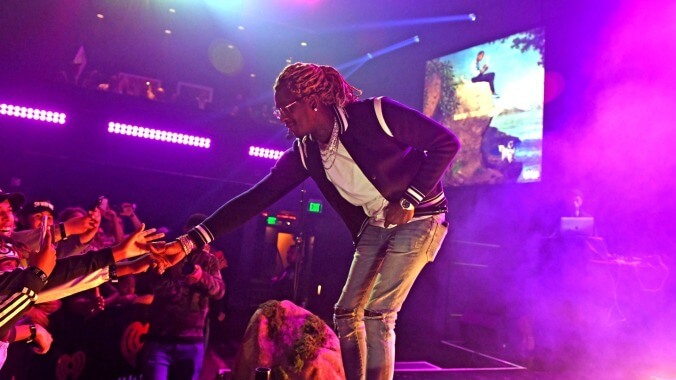Read This: a deep dive into the expansive, troubling indictment of Young Thug's YSL label
The Atlanta innovator spent years building a vibrant coalition of trappers. Now, Thug and more are being tried on their lyrics in criminal court. What happened?

Life regularly imitates art; whether that happens whimsically, poignantly, or frighteningly just depends on the mood of the universe. But sometimes, the eerie similarities between an artwork and an ensuing momentous real-life moment feel downright prescient. The 2015 Key & Peele sketch “Rap Album Confessions” is one of those artworks: a sarcastic send-up of the criminal justice system that, years later, would become all too sincere in the case of Young Thug and his Young Stoner Life label.
In the clip, Jordan Peele plays a rapper facing an interrogation by a detective (Keegan Michael Key) who is all-too-certain his perp is pinned, based on the evidence in his rap music. Peele also isn’t worried, however: they’re just lyrics, he insists, and it’s just a song. “I have a vivid imagination,” Peele deadpans after Key plays back a verse where he shares specific details about a murder. The joke plays on the fact that Peele’s lyrics make it maddeningly clear (if to be taken seriously) that he did commit a crime. But its real satire falls on the fact that it’s inherently ridiculous to convict based on a lyric in a creative work— if that were a legal standard, wouldn’t Sublime have faced a hard time for this by now?
Seven years later, a new and far bleaker vision of the clip played out as Young Thug (real name Jeffery Williams), who since 2016 has fostered a vibrant coalition of multigenerational trappers with his label Young Stoner Life, was arrested alongside 27 label-mates, including Gunna. Per the charges, members of YSL violated Georgia’s Racketeer Influenced and Corrupt Organizations (RICO) Act—allegations that align the label more with criminal gang activity than collaborative art-making. In a new article, The Face’s Christina Lee chronicles Williams’ life and career, the story of how a once-divisive creator who grew to shape the mainstream, became embroiled in “a legal saga that has halted his career at its commercial peak and, with his lyrics being employed against him by prosecutors, reignited the debate around using art as evidence in court.”
The Face boldly asserts that Williams is “one of the artists to have most reshaped contemporary hip-hop in his image,” but Lee backs it up deftly and artfully in her piece, which we highly recommend you read in full here. Lee paints an expansive portrait of Williams’ rise from an energetic, wildly creative teenager calling himself the next Lil Wayne to a definitive voice in hip-hop whose stylistic influence can be found in the countless rap superstars that followed him.
After thoroughly exploring the person behind the artist, Lee transitions to the criminal kingpin he’s accused of being. Going as far back as Georgia’s introduction of the RICO act 52 years ago, Lee paints a stark picture of how the indictment—which notably, misidentifies YSL as standing for “Young Slime Life”— reduces YSL to a street gang and flags Williams as their leader.
“[Williams] put in more than 10,000 hours – 20,000 hours. He spends his life at the studio,” one of Williams’ earliest producers, Dun Deal, tells The Face. “For people to take what he did and distort it, that probably hurts the most.”
Although the 56-count indictment is extensive and will likely lend to a complex and high-profile trial (Lee spares no detail in laying specific charges, lyrical “evidence,” and how it all might play) many of Williams’ closest collaborators have spoken out in support of the rapper. Metro Boomin, Meek Mill, and Post Malone have all publicly stood behind Williams.
Furthermore, 300 Entertainment co-founder Kevin Liles and Atlantic Records chief operating officer Julie Greenwald have launched a joint petition titled Protect Black Art in lieu of Williams’ indictment. The petition aims to “limit the use of lyrics as evidence in US federal and state courts and follow the example of S7527"— a New York law that appears to not only have support not only in the rap world, but in the senate.
“This practice isn’t just a violation of First Amendment protections for speech and creative expression,” the petition reads. “It punishes already marginalised communities and silences their stories of family, struggle, survival and triumph.”